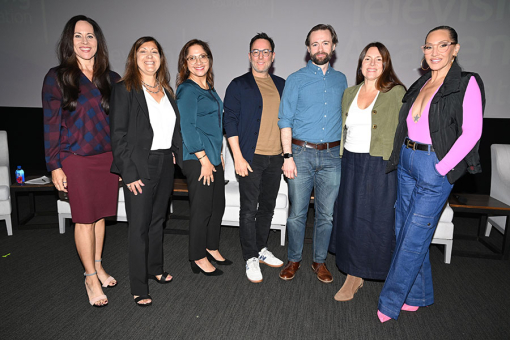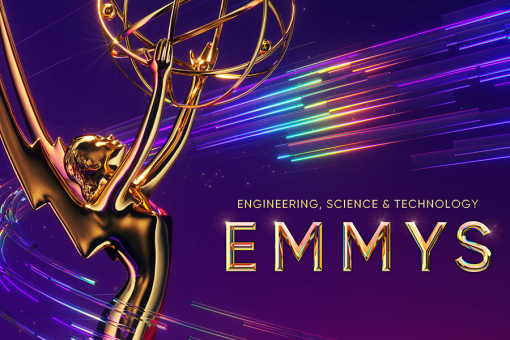Chances are most people working in television aren’t familiar with such terms as three-axis gimbal system, accelerometer motion-sensing components or 3D texture painting. But certainly, they know about imagination, trusting one’s instincts and the watchword of the entire medium: storytelling.
As acceptance speech after acceptance speech proved at the 76th Engineering, Science & Technology Emmys, the visionaries behind the products and processes being honored are as devoted to effective storytelling as any writer, director or performer.
Part of a team who received statuettes for the DJI Ronin Series, which uses that three-axis gimbal system to stabilize cameras for smooth, steady footage, DJI senior product line manager Paul Pan, noted, “This award is not just recognition of the technical achievements that we’ve accomplished, but it’s also a celebration of the creativity and passion that drive our entire team. You are the heartbeat of the Ronin Series, working tirelessly day and night, making the impossible a reality. [The series] is not just a product; it’s something that we’ve created that has allowed for an entirely new way of storytelling.”
Held October 23 at the Academy’s Saban Media Center in the NoHo Arts District, the awards honor engineering and other technical achievements by an individual, company or organization that either improve existing methods or are so innovative that they affect television production, recording, transmission or reception, thus enhancing storytelling.
After a year’s break, Kirsten Vangsness, who played FBI technical analyst Penelope Garcia on the CBS crime drama Criminal Minds and now does so on the Paramount+ reboot Criminal Minds: Evolution, returned for her eighth time as ceremony host. As in previous years, she delighted the audience with a medley of tunes and her original lyrics to salute the recipients.
Jensen Huang, founder, president and CEO of NVIDIA, was honored with the Charles F. Jenkins Lifetime Achievement Award, bestowed upon a living individual whose ongoing contributions have significantly affected the state of television technology and engineering.
A pioneer of accelerated computing since its 1993 inception, NVIDIA in 1999 invented the GPU (graphics processing unit), which fueled the growth of PC gaming, redefined computer graphics and sparked the era of modern AI. The company is now at the forefront of generative AI.
Huang, who was out of the country, accepted via video. “Our work has always been in service of storytellers, scientists and dreamers, to push the boundaries of what’s possible,” he said. “Seeing NVIDIA technology bring so many award-winning shows to life brings us great joy. Whether It’s the mind-bending androids of Westworld, the dragon-scorched battles of Game of Thrones or the intergalactic journeys of The Mandalorian, these fantastical worlds are brought to life for audiences through the powerful partnership of human creativity and cutting-edge technology. We are now witnessing a significant technological revolution with artificial intelligence. … AI is fundamentally reshaping computing and will transform how stories are told, produced and experienced. … [At NVIDIA,] we love creating the technologies that elevate cinematic art and entertain the world. Thank you for this tremendous honor and for recognizing technology’s impact on the art of storytelling.”
Adobe Inc. received the Philo T. Farnsworth Corporate Achievement Award. Named for the renowned scientist who pioneered the invention of television, the award is given to an agency, company or institution whose contributions have significantly affected television technology and engineering. Adobe’s digital tools allow users to foster creativity, boost document productivity and power businesses, and have been used for such shows as Saturday Night Live and The Bear.
Erica Schisler, principal product manager, Adobe Digital Video and Audio, accepted the honor. “What an amazing award. Thank you so much,” she said. “Farnsworth had hoped and envisioned that television would bring everybody together, and I believe that Adobe believes in that vision, too. Our mission is to empower creators — filmmakers, artists, storytellers — to amplify their voices and to connect audiences in new, meaningful ways. This award belongs to all of them, to all of those brilliant creators who use Adobe tools to shape groundbreaking television and media of all kinds. We’re proud to enable that work, and we’re forever inspired by all the amazing things they do and how they push the boundaries of storytelling. … We’re honored to continue supporting the future of storytelling through innovation and creativity. Thank you.”
Adobe Inc. also received one of eight Engineering Emmys, awarded to individuals or companies, for the development of the Substance 3D Painter, used in visual effects and animation. Honored alongside Adobe and the DJI team were a four-member team that developed the Avid Multicamera System; another quartet for the DRS™Nova Film and Video Restoration Software v6.0; Benjamin Graf, for Accentize’s dxRevive Pro speech-restoration plugin; a HELIOS team, for Megapixel’s Helios LED Processing Platform for LED walls; Craig Seidel, for the MovieLabs Digital Distribution Framework to deliver data and other essentials for a better home content-viewing experience; and The Tiffen Company, for the Steadicam® Volt™, which bolsters camera operation.
The committee determining the awards is cochaired by Wendy Aylsworth and Barry Zegel, who are the governors of the Academy’s Science & Technology peer group.
More information on the Engineering, Science & Technology Emmys and this year's recipients is available here.
Creativity and Cutting-Edge Tech Celebrated at 76th Engineering, Science & Technology Emmys
Speeches salute synergy between scientific achievement and storytelling; NVIDIA founder Jensen Huang and Adobe Inc. receive special awards.











